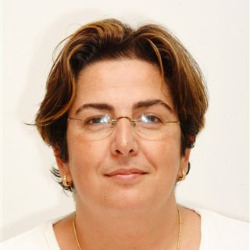Professor Marcelle Machluf juggles her family and research in three groundbreaking fields: Cancer therapy, gene therapy and tissue engineering.

On her frequent world travels in pursuit of science, Prof. Marcelle Machluf reads in Hebrew when she’s departing from Israel and in English on her way back home. She sees no reason to limit herself – in languages or in science.
“My research is in three areas: Drug delivery, particularly for cancer tumor therapy; gene therapy, developing technologies that can help deliver genetic material encoded for therapeutic purposes to particular organs; and tissue engineering, building organs – right now, my focus is on heart and blood vessels, in the laboratory,” Machluf enumerates.
She is speaking with ISRAEL21c from Singapore, where she’s spending a six-month working sabbatical from her position as associate professor at the Technion-Israel Institute of Technology’s Faculty of Biotechnology and Food Engineering.
Israeli women have no time to stop and think
“My problem – and it’s a good problem – is that all of these areas are of interest to me and I wanted to see how they’d develop in the lab. I was very fortunate to have had excellent students at the Technion. We excelled in each of these fields and had such good progress and results that I couldn’t focus on only one. Many things are mutual to all of these areas, so you can pursue all of them without getting too dispersed.”
Multi-tasking comes naturally to Machluf. She arrived in Israel as a baby, brought by her mother and grandmother from Morocco in 1964. Her mother worked as a seamstress and cleaner. “It was difficult for my mother and grandmother to support a family in a new country, but they always said education is a must,” she recounts.
Paying her own way with savings from military service, including an additional optional third year as an aircraft technician for the Air Force, Machluf received her bachelor’s degree in biology from the Hebrew University, and then her master’s and Ph.D. in chemical and biotechnology engineering from Ben-Gurion University of the Negev in 1996.
By the time she left for postdoctoral research as a fellow at Harvard Medical School, taking her mom along, she was married with a daughter and son. Another son, now a sixth-grader staying with his mother in Singapore for the semester, was born during the family’s five-year sojourn in Boston.
“I think this is typical for Israeli women,” Machluf reflects. “You do everything at once because you don’t have time to do them one by one. After the army you want to get married and have children but you also want to get an education. It’s easier if you don’t think about it, because if you thought about it you would probably stop.”
Turned down by medical school
She stresses that her husband, Yigal, shares the credit for her accomplishments. In order to accompany his wife to Harvard, he left his job at Motorola and became a driving instructor so that he could help with the housekeeping and childcare.
“Behind every successful woman is a supportive husband,” she says. “My husband took his job and put it aside and went with us to the United States, but it was not easy.”
She has experienced enough setbacks in her life to appreciate her husband’s sacrifice all the more.
When Marcelle was still in middle school, her mother suffered a broken back and had to stop working for a long period. This misfortune had a silver lining, however. “I had to accompany my mother to many hospitals,” she recalls. “I became familiar with a lot of physicians and decided I wanted to be a doctor. But I was not accepted into medical school.”
Nothing can replace Israel
Determined to keep trying, she stayed with biology and eventually became the first Ph.D. student of prizewinning biomedical researcher Smadar Cohen. In the process, she “found a wonderful world of science I was not familiar with,” the interface between engineering and life sciences. Cohen and Machluf built a research lab together and Cohen encouraged her protégé to reach for the stars. This field is among the hottest areas in applied science today.
Tissue engineering in particular is what brought Machluf to Singapore. The government asked the Technion to send three professors to help its universities “encourage students to innovate in new areas.” They were particularly eager to understand the Israeli approach to commercialization and start-up businesses based on scientific research, Machluf says.
Although her own research has not yet reached the stage of clinical studies, she hopes that within the next 10 years at least one of her discoveries will be implemented by a biotech start-up.
Living in Haifa, she travels often to professional conferences in Europe, North America and Asia. She says that although her family loved Boston and she was tempted to accept attractive job offers there, “we knew we were coming back after I had accomplished what I needed to do. We are very Zionist and we wanted to raise our kids here, so there was never a question. Nothing can replace Israel.”












